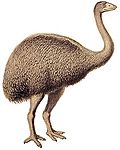Lesser moa
The lesser moa[a] (family Emeidae) were a family in the moa order Dinornithiformes. About two-thirds of all moa species are in the lesser moa family.[2] The moa were ratites from New Zealand: flightless birds with a sternum but without a keel. They also have a distinctive palate. The origin of the ratites is becoming clearer as it is now believed that early ancestors of these birds were able to fly and flew to the southern areas that they have been found in.[3] SpeciesCurrently, six species of lesser moa are recognised, belonging to four genera. These are:[3][4]
Notes
References
|
||||||||||||||||||||||||||||||
Portal di Ensiklopedia Dunia

















